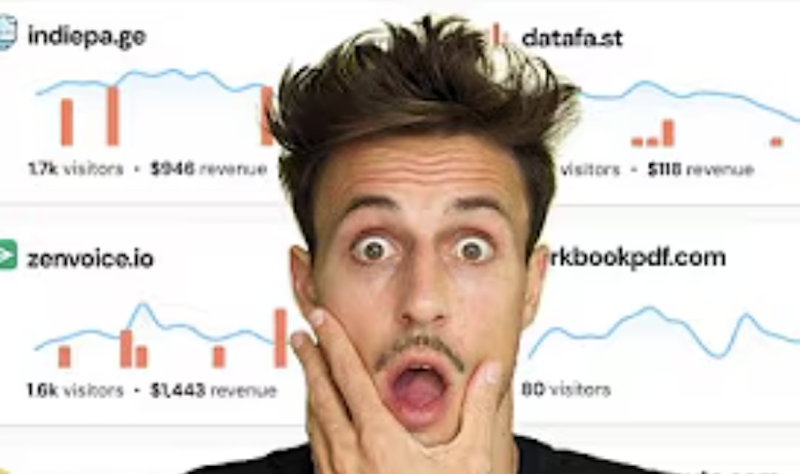
SoloBiz Story: Marc Lou
中文By SoloBiz Story Team | 2025-05-05
Introduction
In 2017, Marc Lou stood in Seoul airport, in tears, having just abandoned a failed startup with only a few thousand dollars left. He had dreamed of becoming a tech giant but faced repeated setbacks, taking two years to earn his first dollar online. Six years later, in 2023, he was running a one-person business from a Bali café, earning around $80,000/month, having built 17 projects solo. This French solopreneur’s story shows us: failure is just the beginning, and persistence plus trial and error can lead to success.
The Journey
Marc Lou’s entrepreneurial journey began in 2016, inspired by the movie “The Social Network.” His first project was “Tinder for sports lovers,” a matching app for sports fans. He spent a year learning to code and building, but with no business model, it failed. He worked as a waiter in Paris but never gave up. In 2017, he heard about a startup school, quit his job, and flew to Seoul to co-found an AI startup with his friend Sacha. They raised $100,000 in angel investment but shut down after nine months with nothing left. Marc hit rock bottom, even starting to smoke again.
In 2018, Marc changed his strategy. Seeing an ad for couple gloves, he started a Facebook reselling business in Korea and made his first online dollar. This gave him hope and proved the solo business model possible. That year, he launched VirallyBot, a SaaS tool for escape room businesses ($199/month), and moved to Bali, earning $1,500/month. He learned to surf and enjoyed tropical life with his Korean girlfriend. Life was good, but in 2020, COVID hit, the escape room industry collapsed, and his income went to zero. Back in Paris, living with family, he got depressed and quit entrepreneurship, working as a product manager for influencer Tai Lopez.
In November 2021, Marc was laid off by Tai Lopez, which became a turning point. On X (formerly Twitter), he discovered the “build-in-public” community, inspired by Pieter Levels and Danny Postma. These solopreneurs build small startups from anywhere in the world with just a laptop, achieving financial freedom. With only $20,000 left and limited coding skills, Marc returned to Bali and started launching products rapidly. In six months, he released seven projects, including Mood2Movie (a mood-based movie recommendation app). Most projects weren’t profitable, but Mood2Movie went viral on Reddit, attracting 10,000 visitors and helping him gain 1,000 followers on X, building his initial community. Marc began sharing his failures and marketing strategies, attracting many indie hackers and solopreneurs.
From 2022 onwards, Marc accelerated. He followed Pieter Levels’ “12 months, 12 startups” challenge, launching 17 products in two years, including ShipFast (a SaaS boilerplate for founders), IndiePage (a showcase tool for solopreneur projects), and LaunchViral (a course on viral video marketing). ShipFast became his main revenue source, reaching $64,500 in its first month after launching in September 2023. By March 2024, his total monthly income hit $83,212 from 10 profitable projects like PoopUp ($2,900/month) and ZenVoice ($1,300/month). His annual income surpassed $1 million in 2023 and is projected to reach $1.5 million in 2024. His X followers grew to 73,000, and he posts about 14 tweets weekly, sharing income data, lessons, and marketing strategies, attracting many indie hackers and solopreneurs.
Lessons & Insights
Marc Lou’s journey offers three key lessons for solopreneurs:
- Rapid experimentation and iteration: Marc launched 17 projects in two years. Even if some weren’t profitable, he learned from each attempt. He believes the advantage of solopreneurs is speed—quickly launching products and iterating based on feedback is more effective than chasing perfection.
- Build in public and grow your community: By sharing real income, challenges, and lessons on X, Marc attracted 73,000 followers. His transparency not only brought traffic but also built trust, making him an inspiration for indie hackers.
- Solve your own pain points: Marc’s successful products, like ShipFast, came from his own needs. He advises solopreneurs to start with familiar problems and build simple, practical solutions that meet real market demand.
Conclusion
From a Paris waiter to an $80,000/month solopreneur, Marc Lou’s seven years of persistence prove that success is not overnight but comes from countless restarts after failure. His story reminds us that no matter how low the starting point, as long as you bravely experiment and learn, freedom and achievement will come. Do you have your own solopreneur dream? Share your story in the comments or subscribe to our blog for more inspiring founder stories every week!
Sources
- Marc Lou Newsletter: My solopreneur story from 0 to 65k month in 2 years
- Marc Lou Newsletter: My first $1 online as a solopreneur
- Medium: $80K/Month in Bali: Marc Lou’s Full Solopreneur Strategy
- Medium: How Marc Lou Turned Failure Into a $1.5M Success Story
- Starter Story: Marc Lou made 528K in 4 months with ShipFast
- Indie Hackers: How Marc Lou makes 50k every month with multiple products
- LinkedIn: Marc Lou’s $83k income in March 2024
